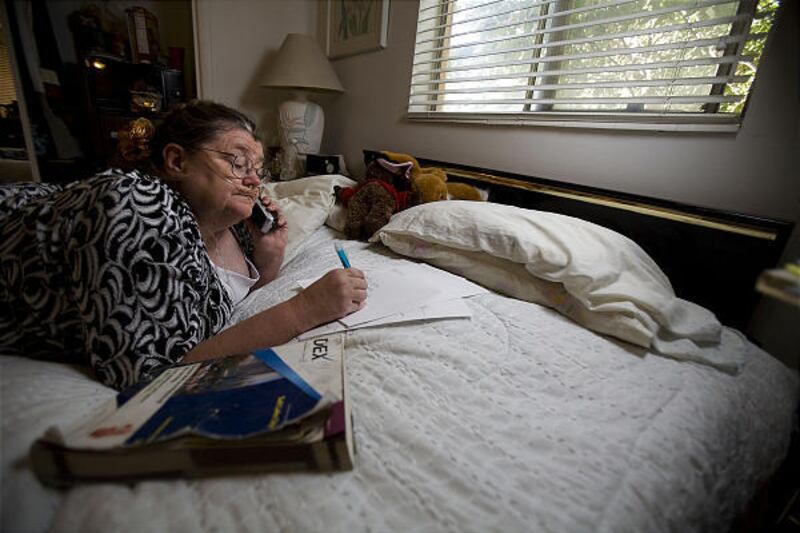Editor's note: This is the second of a five-part series.
Medicine saved one Utah woman when she developed a kinked colon that required emergency surgery. It saved another when a freak outdoor accident nearly destroyed her face. And it saved a man in his mid-40s dying of cancer.
But when the bills for the care that saved them came due, medicine almost destroyed their lives.
These three are among the hundreds who file for bankruptcy each month in Utah. And though no one tracks precisely how many of those bankruptcies are primarily due to medical bills, some experts put the number at close to 60 percent. Few dispute the contention of noted economics expert and
Harvard law professor Elizabeth Warren that 90 percent of the families who file for bankruptcy have at least one of these three reasons: job loss, medical problems or a family breakup through death or divorce. Half, she says, have two of the three and 20 percent have all three.
In just the first nine months of this year, 10,706 bankruptcies were filed in Utah, including 6,905 Chapter 7, where assets are liquidated to pay debts, and 3,731 under Chapter 13, which allows "debt adjustment" for individuals and families.
The bankruptcy court does not keep statistics on type of debt leading to bankruptcy, but the clerk of the U.S. Bankruptcy Court for the District of Utah, David Sime, said medical debt is unquestionably a significant contributor. And he notes that it's sometimes hard to quantify because "there's a trend to use credit cards (to pay medical bills). So if someone listed $20,000 in credit card debt, some of that could be medical." That also means that when researchers comb through filings for studies, medical bills may be hidden and a more significant factor than it appears.
Utah attorney Marji Hanson, who specializes in bankruptcy, says it's rare not to have medical creditors as part of a bankruptcy filing. "It happens all the time," she said. "Sometimes there's no other debt. When Congress passed bankruptcy reform in 2005, there was huge delusion (that) people were filing to scam the system. But it really is divorce, loss of a job and illness. And right now it's also mortgages they cannot afford."
It is not too surprising that not one of the bankrupted people the newspaper interviewed wanted to be the face of financial meltdown; Warren said studies show that 80 percent of those who file for bankruptcy hide their financial crisis from parents, friends or sometimes their own children. Or that a couple of people who had agreed to talk on the record abruptly changed their minds, preferring anonymity.
This trio are not composites; they are Utah residents with full and complicated lives. They each had some kind of health insurance, but it turned out their coverage wasn't enough for the medical crises that afflicted them. And theirs are not the stories of people who skip out on their debts without trying, either. Each struggled to pay their medical debts, sometimes maxing out credit cards and taking second mortgages and second jobs. They still just got further and further behind.
They are also representative of hundreds, if not thousands more across the state. One woman who talked to the Deseret News shared her story about a devastating car crash that led to bankruptcy after a hospitalization that lasted longer than her finances could handle. Another man suffered a complex arm injury that required four separate surgeries, the cost of which eventually left him financially broken. And then there's the senior citizen who successfully fought cancer and is now bankrupt, even though a substantial portion of her medical bills was forgiven by a local hospital. Each found the pain of financial ruin too difficult to speak about on the record.
"Personal finance problems always feel like personal failure," the senior citizen cancer survivor said.
For years, bankruptcy attorney Hanson has watched unexpected circumstances like a car accident or chronic disease send people into a spiral that can end in financial ruin. It could happen to anyone, Hanson says.
Area hospitals point out that they give away millions of dollars of service in the form of charity care. And they try to work with patients who are strapped so they can come up with payment plans that are doable. But for some, it's simply not enough. And hospitals each year also write off millions in uncollected and "bad" debt.
The woman with the twisted intestine, who is in her late 50s, fought for over a year to keep up with her medical bills and keep the business she runs from home afloat. Today, more than a year later, her failure still bothers her. "I felt like, I should have been able to do this. Why couldn't I work 10 more hours a day? But I was sick."
Lee Anne Walker doesn't mind talking about the financial effects of illness, perhaps in part because she's still hanging on, although her grip is tenuous. She is 60 and physically limited by spina bifida, scoliosis that's growing worse and the after-effects of corrected club feet. But she's also a lawyer and a businesswoman; she started Handi Van Inc. 25 years ago to take people with disabilities to their doctor and other appointments. These days, she calls herself a "physical and financial wreck because of health-care costs." And she predicts she'll be in increasingly good company as baby boomers and soldiers returning from war realize they can't keep up with the financial side of their medical needs.
She's living right now in what her sister-in-law, Deborah Woods, calls with great irony "the eternal six weeks." For the past few appointments, her doctors told her it will take about six weeks for her pressure sore to heal. She got that from being bedbound after she jammed her foot. While that foot injury is likely permanent, if she could get her wheelchair fixed so it would raise her leg and keep blood from pooling, she'd at least be able to get around a bit. That's always somewhere about six weeks out, too.
A decade ago, she made a great living from a successful law practice, the transportation company and from a small art gallery. Her house was almost paid for and she'd socked money into a retirement account. She owes as much on her house now as the day she bought it.
She runs the company from her bedroom, where she lives while the pressure sore heals and she figures out how to get a wheelchair she can use. She says she never used the wheelchair that sits by her bed because it doesn't work properly. The supplier said it was used and in substandard condition as soon as she got it but refuses to take it back. Medicare will only help with the cost of a wheelchair every five years.
She works from her bed, lying on her stomach. The fridge and microwave are in a closet to her left and her work-related papers are piled high on a desk to the right. She doesn't need to go very far, which is just as well, because she can't. But she longs to.
A while back, when gas prices neared $4 a gallon and her health premiums were coming due, she had to choose which one to pay. Insurance for a tiny company like hers is exorbitant, she said, and she figured if she didn't make payroll and could not afford gas for the wheelchair vans, she wouldn't be a business and couldn't qualify for the insurance anyway. She let it go. She has dipped deep into her retirement money, sold off stocks and hunkered down, trying to meet bills and hang onto her house. She fears if she loses it she'll end up in a nursing home.
"I have no discretionary income. By the time I pay for housing, food and utilities, I have nothing for much of anything." She has Medicare, but because of the medical issues she's faced since birth, she needed a plan that doesn't restrict which doctors she sees and that means her copayments are higher. One pill she's supposed to take monthly has a $65 copayment. So she skips taking the pill, though she knows she shouldn't. She's just one serious setback from losing everything but says, "I am not going to give up until I am absolutely beaten. I am trying to find a smart way to save myself and Handi Van."
It is the same fear of catastrophe that keeps Marla Jensen paying for a private insurance policy for her family, even though the price has "hopped up like crazy" over four years, from nearly $700 a month for their family of six to almost $1,200. Her husband was recently laid off and "there's no way we can take that out of savings every month and expect to keep our heads above water." She is shopping for a policy with a high deductible but a decent catastrophic limit. One thing she won't do, she said, is go without. "I would just worry so much about that one thing that would happen and put you under."
e-mail: lois@desnews.com Twitter: Loisco



